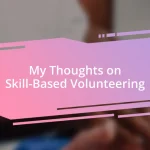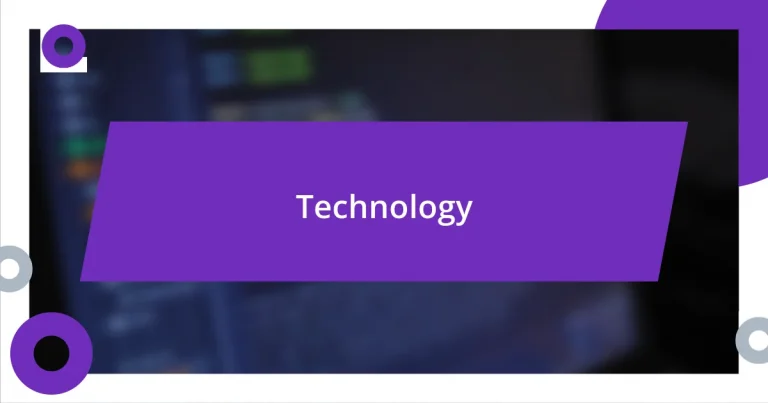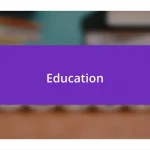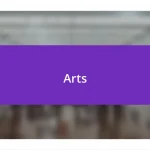Key takeaways:
- Skill development begins with self-awareness and reflection on personal strengths and weaknesses.
- Setting specific, measurable goals and creating structured learning plans enhance focus and progress tracking.
- Seeking feedback and mentorship, along with being adaptable in practice techniques, fosters growth and mastery.
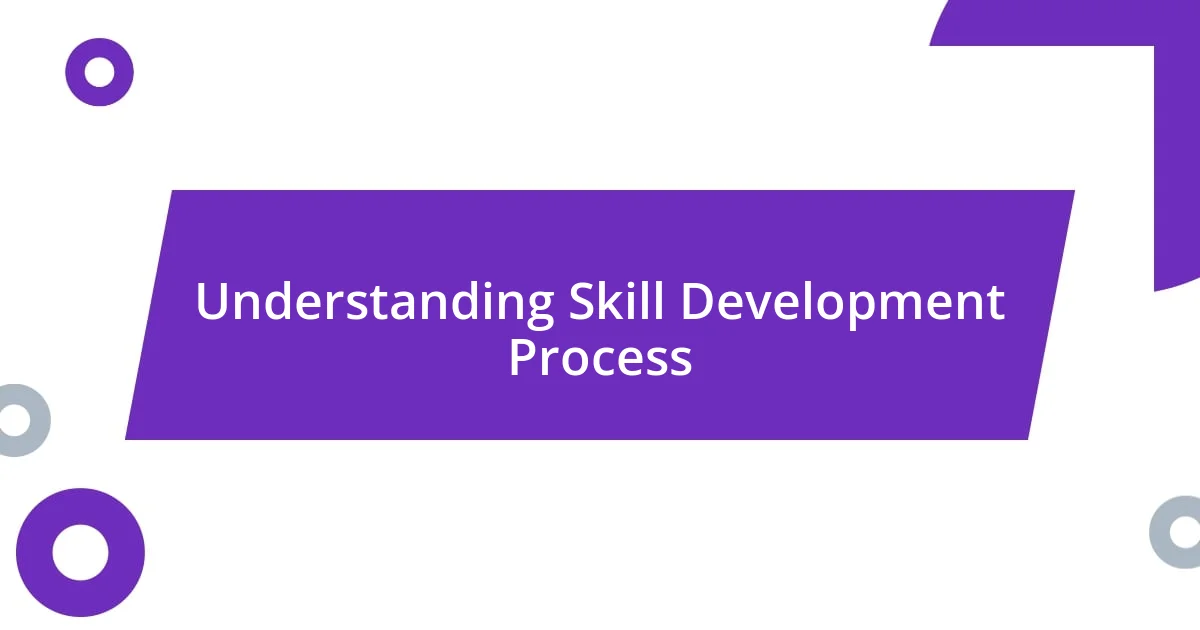
Understanding Skill Development Process
Skill development is a journey that starts with self-awareness. I’ve often found that reflecting on my strengths and weaknesses helps me pinpoint which skills to focus on. Have you ever taken a moment to examine what truly excites you? That insight can guide your learning path.
I remember when I decided to enhance my public speaking skills. It was daunting at first; the thought of standing in front of an audience made my heart race. However, as I engaged in practice sessions and received feedback, I noticed significant growth. Isn’t it fascinating how confronting your fears can lead to mastery?
Finally, tracking progress plays a crucial role in skill development. I keep a journal of my progress, noting both accomplishments and challenges. This practice not only provides motivation but also highlights areas needing improvement. How do you measure your growth? It’s an empowering experience that transforms abstract goals into tangible milestones.
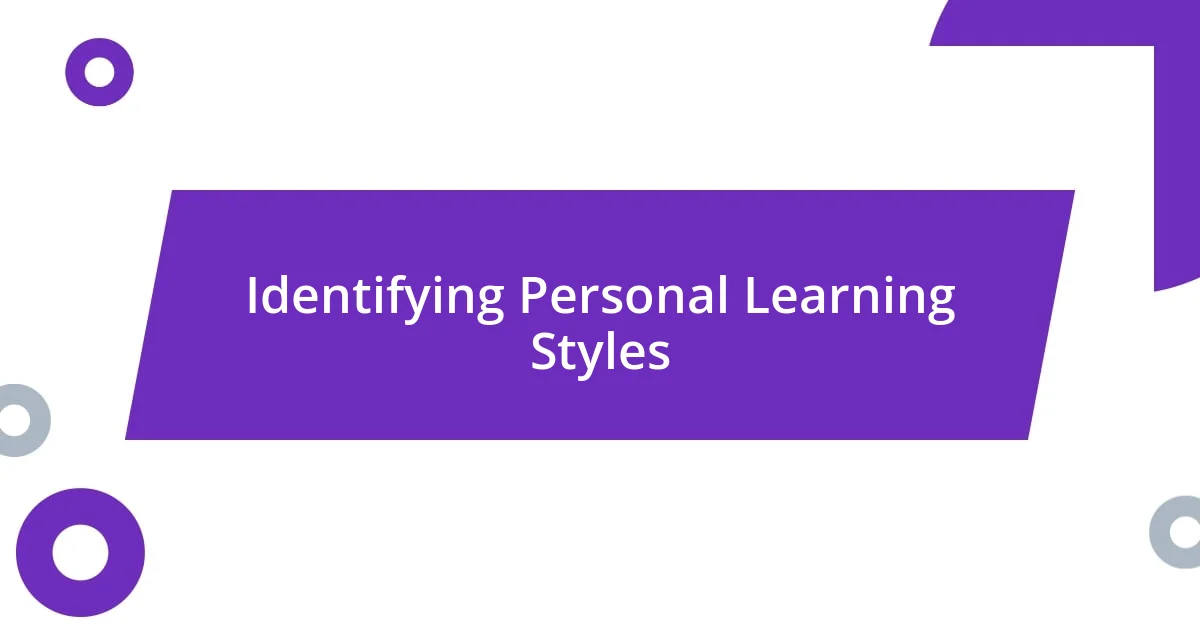
Identifying Personal Learning Styles
Identifying personal learning styles is essential in tailoring an effective skill development strategy. I’ve discovered that I retain information best through visual aids. For instance, when I attended a workshop where concepts were presented with vivid slides and diagrams, I found myself grasping complex ideas more easily. Have you ever noticed how certain formats resonate more with you?
On another note, I tend to struggle with auditory learning. When I listen to lectures, I often zone out, missing crucial points. However, when I take notes while listening, it creates a bridge for me to connect the dots. This realization was a game-changer! Understanding that I need an active role in my learning helped me adapt my approach and find techniques that align better with my style.
Finally, kinesthetic learning comes into play, especially when it involves hands-on activities. During a recent cooking class, feeling the texture of ingredients while preparing a dish made all the difference. I was fully engaged, and it wasn’t just cooking; it was an experience that solidified the knowledge in my hands and mind. How do you experience learning? Embracing these varied styles has enriched my journey.
| Learning Style | Description |
|---|---|
| Visual | Learning through images, diagrams, and visual cues. |
| Auditory | Learning through listening to spoken information and discussions. |
| Kinesthetic | Learning through hands-on activities and physical engagement. |
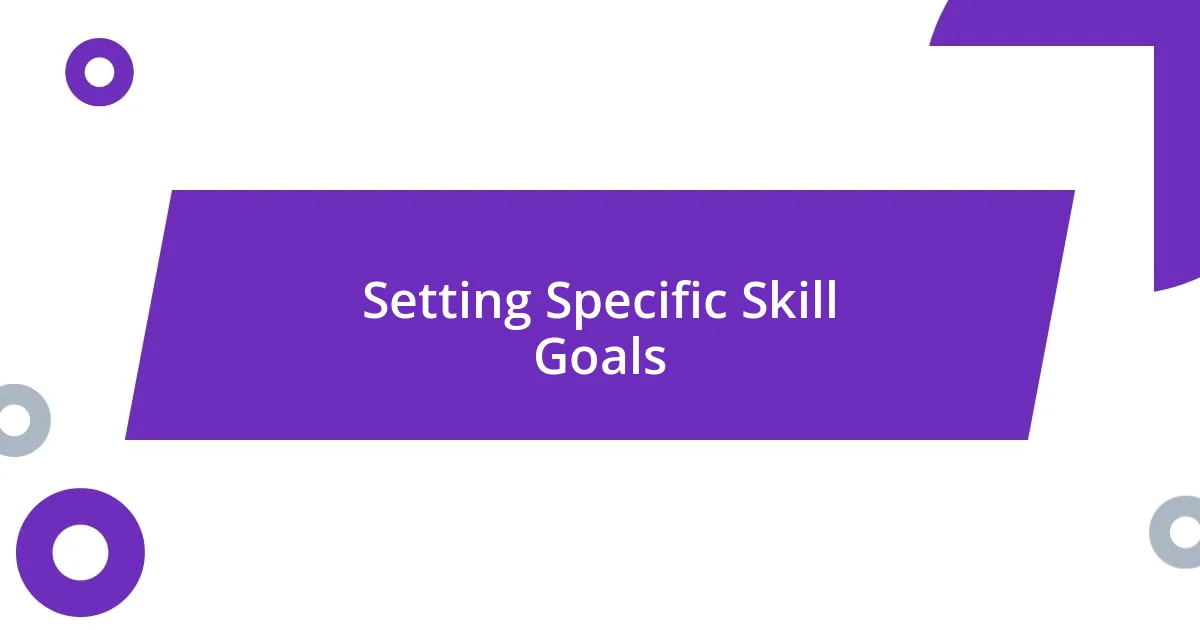
Setting Specific Skill Goals
Setting specific skill goals is a pivotal step in the skill development process. I used to set vague targets like “I want to be better at writing,” but those often led to frustration. One day, I decided to break it down: “I will write 500 words daily for a month.” That specific goal transformed my approach. I could measure my progress and adjust as needed. Have you ever experienced the power of specificity in your goals?
Here are some actionable tips to help you set specific skill goals:
-
Define Clear Metrics: Instead of aiming to “improve in math,” say “I want to score at least 80% in my next exam.”
-
Set a Timeline: Make your goals time-bound. Rather than just “learn guitar,” aim for “learn three songs by the end of the month.”
-
Visualize Achievements: I like to create a vision board that reflects my goals. For example, I had a photo of a crowded stage, reminding me of my target to deliver a presentation at a local event.
-
Identify Steps: Break your goals down into smaller, actionable steps. If my goal was to enhance my coding skills, I’d list tasks like completing one module of an online course each week.
By making my goals specific, I not only feel more motivated but also experience the thrill of checking off accomplishments along the way. What specific goals have you set that excited you?
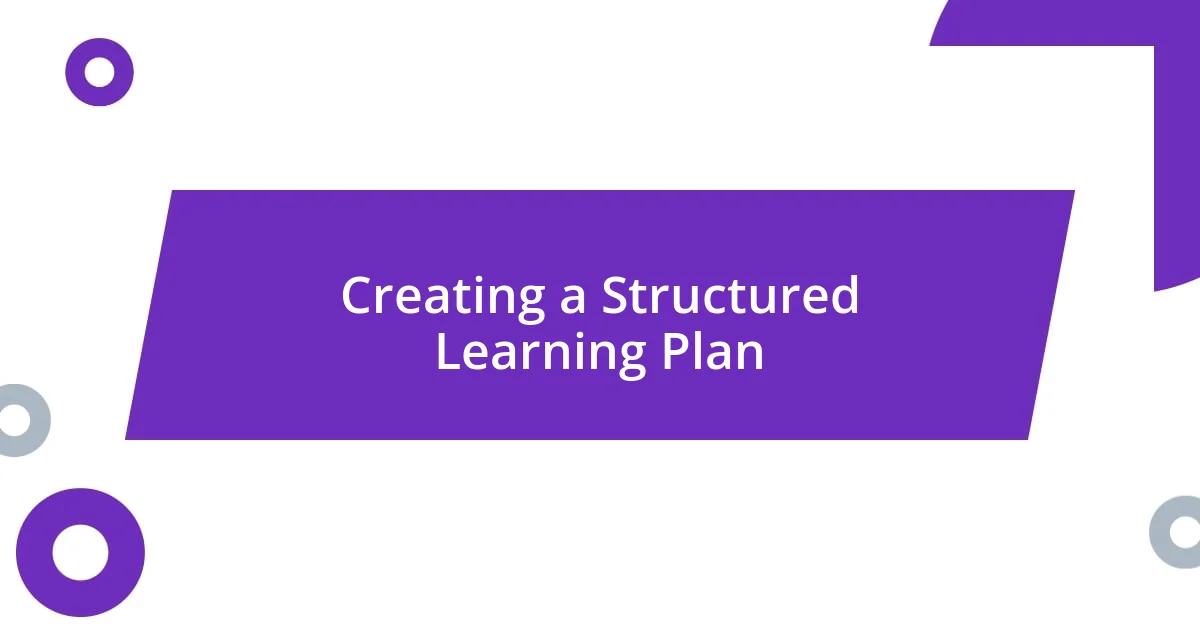
Creating a Structured Learning Plan
Creating a structured learning plan is something I’ve found to be incredibly beneficial. I remember the first time I laid out a detailed schedule for developing my digital marketing skills. I assigned specific topics to each day of the week, using color-coded highlights for visual appeal. This plan not only kept me accountable but also transformed chaotic learning into a manageable process. Have you ever tried scheduling your learning? It can really turn things around!
When I look back at that experience, I realize how setting fixed times for study sessions made a difference. For instance, I committed to a two-hour block every evening when I was least distracted. Initially, it was challenging, but soon, this routine felt just as natural to me as grabbing a cup of coffee in the morning. Creating a habit like this offers a sense of structure that can greatly enhance your focus and retention. How do you find a rhythm that works best for you?
Moreover, I often include reflection periods in my structured plan, where I take a moment to assess what I’ve learned. It’s like having a mini review session! For example, after completing a module on SEO, I’d jot down key takeaways and any questions that arose. This practice not only solidifies my knowledge but also fuels my motivation to dive deeper. Have you considered incorporating reflection into your learning routine? It creates a feedback loop that can be incredibly empowering.
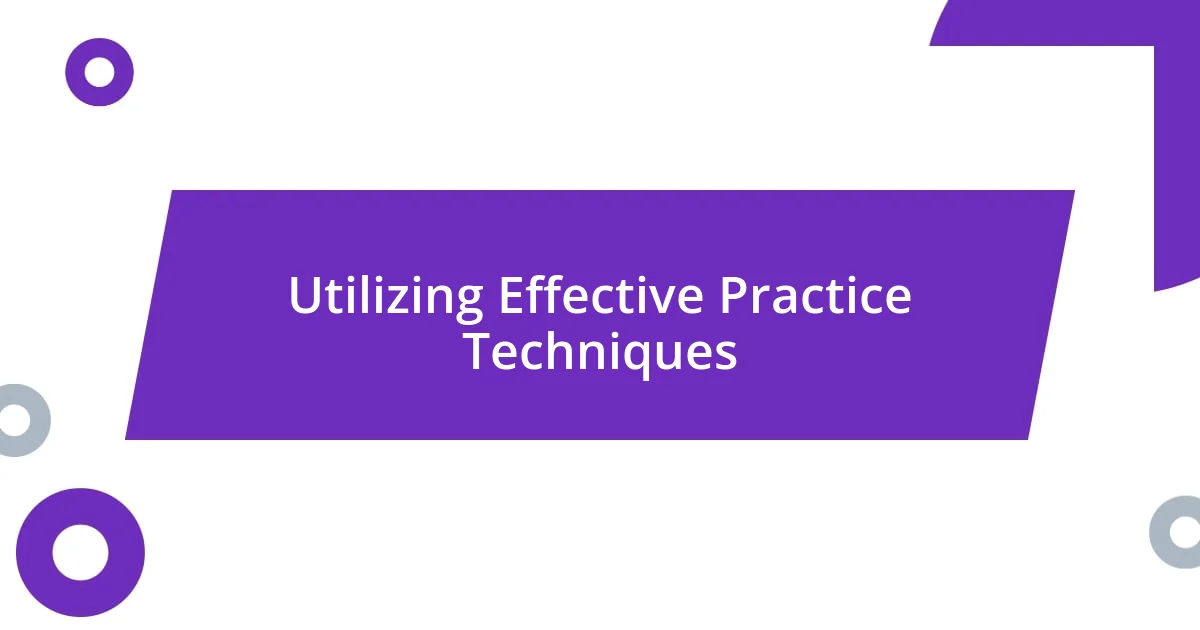
Utilizing Effective Practice Techniques
Utilizing effective practice techniques has been a game changer for me. I remember when I was learning to play the piano, I splurged on a fancy piece of equipment but soon realized that the drift of practice wasn’t just about the tools. Instead, I discovered the power of focused practice sessions. I set a timer for 25 minutes, fully concentrating on challenging passages and then took a short break. This method, known as the Pomodoro Technique, helped me maintain my focus and made the practice feel less overwhelming. Have you ever tried breaking down your practice time? It really can transform your experience.
Another technique that resonated with me is the concept of deliberate practice. Initially, I often played pieces that I already knew well, but I wasn’t improving much. Then I learned to target specific skills, like scales or tricky sections within a piece. This kind of targeted practice had me feeling both frustrated and exhilarated—frustrated because it was challenging but exhilarated when I finally mastered a difficult part. Have you felt that thrilling rush when you finally get it right? That sense of achievement can be so motivating!
I’ve also found that varying my practice methods keeps things fresh and exciting. I once experimented with playing a piece in different styles, like reggae or rock. This not only broadened my understanding of the music but also deepened my appreciation for it. I often ask myself, “How can I make this practice session feel new?” Challenge yourself with different approaches; you might be surprised by what you discover. Remember, effective practice isn’t just about repetition—it’s about exploration and keeping your passion alive.
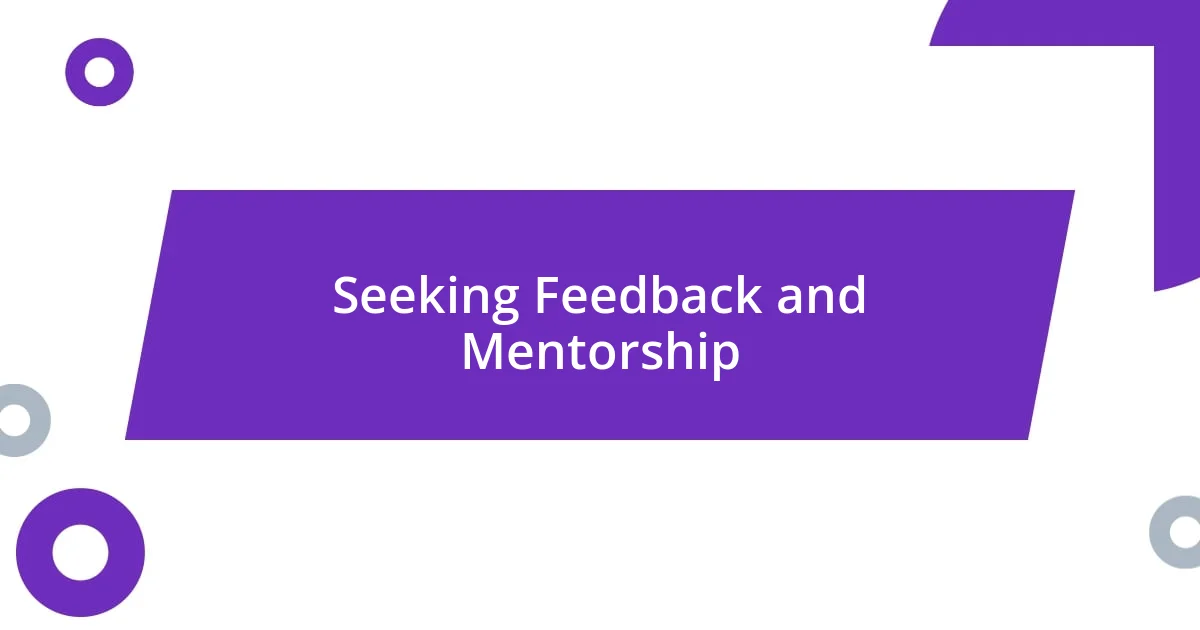
Seeking Feedback and Mentorship
Seeking feedback and mentorship has profoundly influenced my skill development journey. I vividly recall reaching out to a colleague while I was struggling to refine my public speaking abilities. We scheduled regular coffee chats where I would present small snippets of my talks. The genuine, constructive feedback I received not only helped me identify my strengths and areas for improvement but also boosted my confidence immensely. Have you ever thought about how a fresh perspective can illuminate blind spots in your skills?
Additionally, mentorship has been a cornerstone of my growth. I was fortunate to connect with a mentor who not only had experience but also shared my enthusiasm for learning. I remember being nervous during our first meeting, but her encouragement and insights made me realize how invaluable it was to have someone invested in my progress. I believe mentorship isn’t just about guidance; it’s also about accountability. How might your journey change with someone to keep you on track?
When seeking feedback, I learned to be specific about what I wanted to improve. For instance, rather than asking, “Was that good?” I’d ask my mentor to focus on my pacing and clarity. This targeted approach led to richer, more actionable insights, which felt incredibly empowering. I often ask myself, “What extent do I control my learning?” Embracing feedback with purpose has allowed me to stretch my abilities beyond what I thought was possible. How ready are you to seek out that vital feedback?
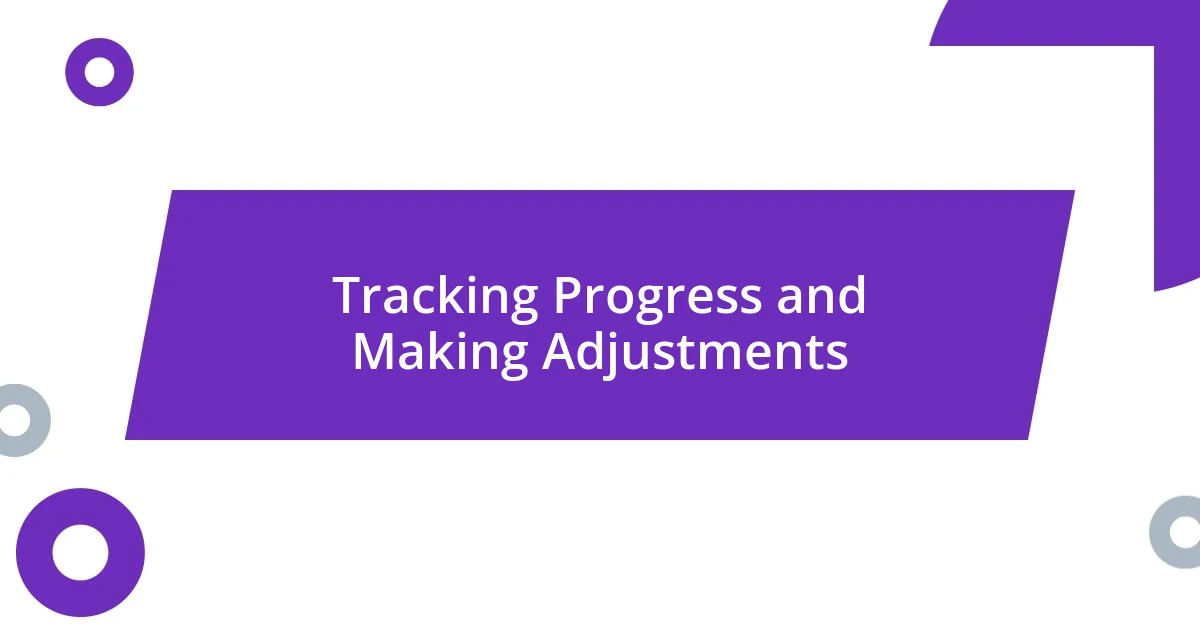
Tracking Progress and Making Adjustments
Tracking my progress has been a pivotal part of my skill development. I remember at one point, I tracked my piano practice through a simple spreadsheet, noting not just the hours spent, but the specific challenges and breakthroughs I encountered. This visual representation of my journey was eye-opening; it showed me how far I had come and where I needed to focus next. Have you ever reflected on your progress in such a tangible way?
Making adjustments was initially a daunting task for me. I used to think if a particular practice routine wasn’t yielding results, it meant I was doing something wrong. However, I’ve since learned that flexibility is key. When I felt stagnated with a piece, I’d change my approach entirely—like practicing it at different speeds or even trying to play it on another instrument. This shift not only reignited my enthusiasm but often unveiled new techniques that I hadn’t explored before. How do you adapt when you hit a roadblock?
Data-driven insights have also guided my adjustment process. By analyzing my practice stats over time, I could pinpoint patterns—like which techniques consistently led to breakthroughs versus those that didn’t. For example, I found that I progressed more when I alternated between focusing on technique and expressive playing. This realization transformed my practice, preventing burnout while maximizing growth. Have you considered how a data-driven approach could adjust your skill development strategy?






